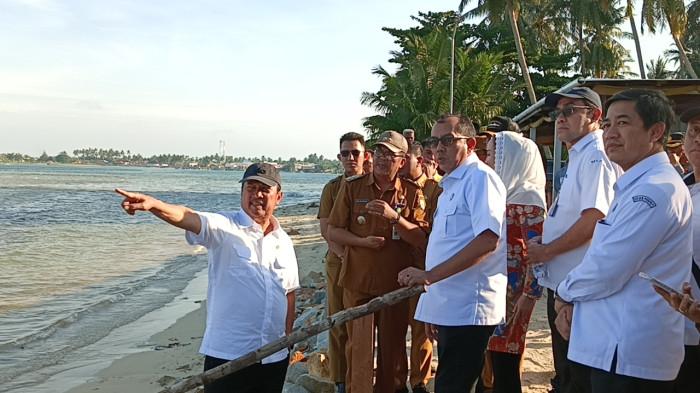Indonesia has once again reinforced its commitment to maritime development with the support of Japan International Cooperation Agency (JICA). The construction of fisheries infrastructure in Natuna, located in the Riau Islands province, represents a significant milestone in advancing Indonesia’s blue economy while strengthening national food security. This project highlights how international cooperation can support sustainable fisheries, boost local livelihoods, and ensure long-term marine resource management.
The recent inspection visit by Indonesia’s Minister of Maritime Affairs and Fisheries emphasizes the importance of this initiative. The project not only strengthens Indonesia’s maritime sector but also strategically places Natuna as a key hub in the country’s fisheries industry.
Strategic Importance of Natuna in Indonesia’s Maritime Economy
Natuna has long been recognized as one of Indonesia’s most strategic maritime regions. Situated at the northern tip of the Riau Islands, it lies directly along key international shipping lanes. Its waters are rich in fisheries resources, making it an ideal location for investment in fisheries infrastructure.
By developing modern facilities under the JICA fisheries infrastructure project, Indonesia seeks to enhance the capacity of local fishermen, reduce post-harvest losses, and increase exports of marine products. According to the Ministry of Maritime Affairs and Fisheries, Indonesia’s fisheries sector contributes around 2.7 percent to the national GDP, and Natuna is expected to become a major contributor to this figure once the facilities are fully operational.
The JICA fisheries infrastructure project includes the construction of cold storage facilities, fish landing sites, processing units, and supporting utilities. These investments will not only modernize the local fisheries industry but also integrate Natuna into global seafood supply chains.
Strengthening Indonesia’s Food Security Through JICA Support
One of the key goals of the JICA fisheries infrastructure project is to strengthen Indonesia’s food security. As the fourth most populous country in the world, Indonesia faces increasing demand for protein-rich foods. Fish is a major component of the national diet, with per capita consumption averaging 55 kilograms per year, according to official data.
By upgrading Natuna’s fisheries infrastructure, Indonesia will be able to optimize its fisheries potential while reducing dependency on imports. Cold storage systems, in particular, will allow local producers to maintain product quality and extend shelf life, ensuring that fish harvested in Natuna can reach domestic markets across Indonesia as well as international buyers.
The project also creates opportunities for local fishermen to increase their income. With better facilities, fishermen can avoid distress sales, where they are forced to sell their catch at low prices due to limited storage. Instead, they can negotiate better deals, improve profitability, and achieve greater financial stability.
International Cooperation and Sustainable Fisheries Development
The collaboration with JICA reflects the strong ties between Indonesia and Japan in maritime cooperation. JICA has supported numerous projects in Indonesia, ranging from disaster risk management to infrastructure development. The fisheries infrastructure in Natuna adds another dimension to this partnership, focusing on sustainability and the blue economy.
Sustainable fisheries development is essential in ensuring long-term productivity of Indonesia’s marine resources. Overfishing, illegal fishing practices, and climate change pose challenges to the sector. By introducing advanced infrastructure and modern management systems, the JICA fisheries infrastructure project helps mitigate these risks.
The facilities will be equipped with environmentally friendly technologies to reduce waste and improve energy efficiency. Training programs are also expected to accompany the project, enabling local fishermen and stakeholders to adopt sustainable fishing practices. This aligns with Indonesia’s commitment to the United Nations Sustainable Development Goals, particularly SDG 14: Life Below Water.
Boosting Local Economy and Creating Jobs
Beyond sustainability, the project promises significant economic benefits for Natuna. The fisheries infrastructure development will generate direct and indirect employment opportunities, ranging from construction workers to fish processors and logistics providers. According to government estimates, the project could create thousands of jobs for local communities, thereby reducing unemployment and improving living standards.
Furthermore, the presence of modern fisheries infrastructure will attract additional investments in related sectors such as shipping, logistics, and cold chain management. Small and medium enterprises (SMEs) are also expected to benefit, particularly those involved in fish processing and distribution.
With increased production capacity, Natuna could position itself as an export hub for fisheries products. This would help Indonesia capture a larger share of the global seafood market, which is projected to reach USD 730 billion by 2030, according to the Food and Agriculture Organization (FAO).
Enhancing Indonesia’s Maritime Sovereignty
Apart from economic gains, the development of fisheries infrastructure in Natuna carries strategic significance for Indonesia’s maritime sovereignty. Natuna lies within the country’s exclusive economic zone (EEZ), an area often challenged by illegal, unreported, and unregulated (IUU) fishing. Strengthening Natuna’s role as a fisheries hub will enhance Indonesia’s presence in the region and help enforce maritime law.
By establishing modern facilities and increasing fishing activities in the area, Indonesia sends a strong message about its commitment to safeguarding its maritime resources. This aligns with the government’s broader policy of “Maritime Fulcrum,” which seeks to position Indonesia as a global maritime power.
Looking Ahead: Long-Term Benefits of JICA Fisheries Infrastructure
The long-term impact of the JICA fisheries infrastructure project in Natuna is expected to be transformative. It will not only strengthen Indonesia’s fisheries sector but also contribute to broader economic growth, food security, and maritime sovereignty.
With the growing importance of sustainable resource management, projects like this set a benchmark for how international cooperation can deliver tangible benefits for local communities while aligning with global sustainability standards.
For Indonesia, the JICA fisheries infrastructure project is more than just a development program. It is a step toward realizing the vision of a strong, sustainable, and globally competitive maritime economy.
Read More






 Wednesday, 04-02-26
Wednesday, 04-02-26







